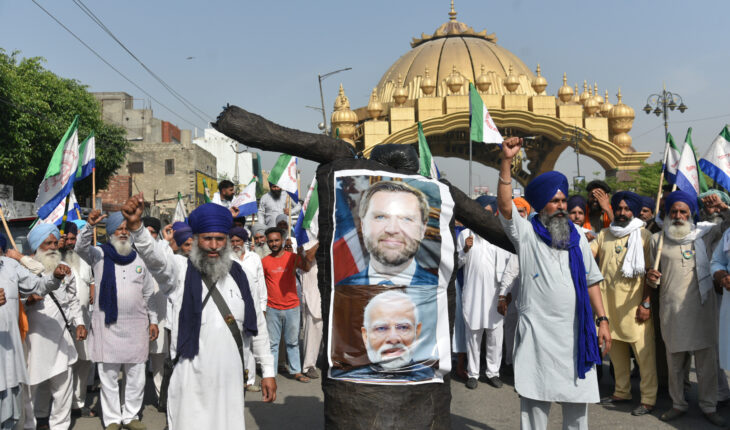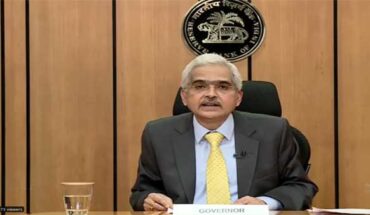During his four- day visit to India US Vice-President J.D Vance had to see the unpleasant incident of brutal massacre of tourists at Pahalgam and also faced the Indian farmers protesting with slogans Vance Go Back! India Is Not For Sale’.
Nearly after a century, Indian soil has again echoed ‘Go Back’ slogan to protest the dignitary of the most powerful country in a planned way. Previously, in 1928 the land of India had also expressed its voice through the ‘Go Back’ slogan when the British representative ‘Simon Commission’ visited India and it had to face the slogan –‘Simon Go Back’.
Now the Trump’s new Tariff Policy, as alleged by the farmers’ unions, thrust upon without considering the Indian common people view point and ground conditions, has also seems to have ignited the ground line and the farmers of India girded up the loin to protest the visit of US Vice-president J.D Vance. The Indian Soil once again echoed the slogan ‘Vance Go Back! India Is Not For Sale”.
Prof (Dr.) S N Tripathy, Former Professor of Economics, Gokhale Institute of Politics and Economics, Pune, says- “President Donald Trump keeps the world on edge with daily blockbuster announcements, thrusting global trade into chaos. His unpredictable tariff policies have sown turmoil and uncertainty among nations and financial markets, leaving leaders pondering.”
What Vance messages through his address at Jaipur?
While addressing the India-US Forum at Jaipur on April 22, the US Vice President said, “President Trump wants America to grow, he wants India to grow, and he wants to build the future with our partners all over the globe. And when I look at this audience, or when I visit this incredible country over these last couple of days, I see a people that will not be held back.”
Vance added, “Critics have attacked my president, President Trump, for starting a trade war in an effort to bring back the jobs of the past. But nothing could be further from the truth. He seeks to rebalance global trade so that America, with friends like India, can build a future worth having for all of our people together. And when President Trump and Prime Minister Modi announced in February that our countries aim to more than double our bilateral trade to $500 billion by the end of the decade, I know that both of them meant it.”
The US Vice-President hoped, “We are now officially one quarter into the 21st century, 25 years and 75 years to go. I really believe that the future of the 21st century is going to be determined by the strength of the US-India partnership. I believe that if India and the US work together successfully, we are going to see a 21st century that is prosperous and peaceful. But I also believe that if we fail to work together successfully, the 21st century could be a very dark time for all of humanity.”
Why the Indian Farmers fear?
Reports received from different corners reveal that the Indian farmers under the banner of All India Kisan Sabha (AIKS), the largest umbrella of Indian farmers, conveyed their message of protest by organizing programmes in several places and burning the effigy of the US Vice President in token of their protest.
AIKS had called upon all its units across India to hold mass demonstrations and effigy burning with the slogan “Vance Go Back! India Is Not For Sale” in villages and district headquarters when the US Vice President J.D Vance arrive in India even as negotiations are on for a bilateral trade deal.
In its call the AIKS had alleged that the Indian Prime Minister has capitulated to the dictates of the US President Donald Trump and is going ahead with plans to ease tariff and non-tariff barriers for US products including farm products. Howard Lutnick, the US Commerce Secretary asserted that India should open its agriculture market and agriculture cannot be ‘off the table’ in the negotiations for the Bilateral Trade Agreement.
The Farmers union feared that the Bilateral Trade Agreement under discussion will be the death-knell of dairy farmers as the US Dairy exports to India will make a quantum jump if tariffs and market restrictions are lifted. The US Wheat Associates claim that India has high levels of domestic support and trade distorting high tariffs; ironically this is while the peasantry in India is on the struggle path for remunerative Minimum Support Price with legally guaranteed procurement. Similarly, in the case of Maize, there is a push to remove India’s import prohibition on genetically modified maize as well on ethanol with expectation of windfall gains for the USA. Soybean, almond, pistachio, walnut, apple and horticultural crops are all up for negotiation at the behest of US based Commodity Cartels. Even as Indian cotton farmers are already in an acute crisis and committing suicide and there is a continuous steady decline in annual cotton production from 37 million bales (170 kg each) in 2017-18 to 34.7 million bales in 2022-23 and estimated further decline to 31.6 million bales in 2023-24, the heightened negotiations for withdrawing tariffs is extremely insensitive.
AIKS argues that a Mission 500 aiming to double total trade to $500 billion by 2030 is in the offing according to news reports. The on-going trade negotiation is a deliberate move so that cheaper cotton, soybean, maize, apple etc. from the USA can be dumped in India, literally swamping the market. This will lead to a price crash for Indian farmers. All negotiations are being done without taking State Governments or the Parliament into confidence. Such Agreements also do not assure the implementation of International Labour Standards.
Quoting the stand of other countries, AIKS states that while countries like China, Canada, Mexico etc., made a resolute push-back against Trump’s tariffs and rallied to defend their economic interests, India has chosen to capitulate and surrender its national interests. Notably, Canada and Mexico with more than 70 percent of exports to the USA did not blink an eye before hitting back, while India with nearly 18 percent exports to the USA is refusing to stand up against the strong-arm tactics of the USA. The farmers’ Union warns that apart from agriculture, the interests of the MSMEs across sectors like generic pharmaceuticals to auto parts and millions of workers across these sectors are also going to be adversely hit.
A statement released on behalf of AIKS by Ashok Dhawale, President and Vijoo Krishnan, the General Secretary observe, “The Vice President of USA J.D.Vance’s visit to India is part of putting pressure upon the State of India and the corporate led ruling classes to surrender the national interests to facilitate windfall profiteering to the Multinational companies.
Dr. Inderjit Singh National Vice-President of the AIKS reported to The Ground Post that the
workers of All India Kisan Sabha (AIKS) registered protest against the visit of US Vice President J D Vance to India in connection with bilateral agreements on tariff and trade negotiations.
Singh stated that AIKS and SKM had given a call to register the opposition of Indian farmers against the bullying tactics by the Trump administration in the issue of tariffs and succumbing to the Modi government.
Addressing a meeting of farmers organised in the local grain market, Rohtak, AIKS national vice president Inderjit Singh questioned the continuing silence of Prime minister Modi while US President Trump has publicly claimed India’s consent to lower down the tariffs on US products in Indian market and open the agriculture sector for the US produce. He urged the farmers and other sections of the people to know about the threats such a bilateral agreement that would prove disastrous for the livelihood of millions of farmers and agricultural labourers and national food security. It was too disgraceful that most of the countries have refused to be cowed down. Modi government was succumbing to US pressures.
He stated that the US will dump its farm produce including fruits, cotton and dairy products in the Indian market while our produce can’t compete with the huge amount of subsidies availed by farmers of developed countries where the cost of production was much less than those in the developing countries.
All India Democratic Women’s Association Vice President Jagmati Sangwan asked the government to stand up firmly and not deceive the people of India to whom it was answerable.
Sumit Dalal, state General Secretary warned that India was not for sale. He reminded that the National Policy Framework on Agricultural Marketing (NPFAM) draft released on 25 November last was also part of the broader agenda of the Modi government to facilitate the corporate to take over the agriculture sector. He claimed that effigies of Trump, Vance and Modi were burnt in all the districts of Haryana and more such protest actions against the unequal trade agreement against national interests that would inevitably be harmful even to other sectors like MSME and automobiles.
What effect the AIKS movement will have on Vance’s visit to India and bilateral Tarriff Agreement, is in the womb of time, but one thing is certain- “Whenever a spark ignites, sooner or later it results in flames of fire.”
Jag Mohan Thaken is a Senior Journalist, Columnist & Political Analyst, views are personal






